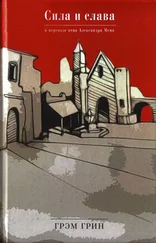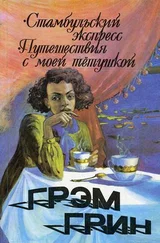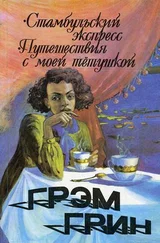Грэм Грин - The Comedians
Здесь есть возможность читать онлайн «Грэм Грин - The Comedians» весь текст электронной книги совершенно бесплатно (целиком полную версию без сокращений). В некоторых случаях можно слушать аудио, скачать через торрент в формате fb2 и присутствует краткое содержание. Год выпуска: 1966, Жанр: Классическая проза, на английском языке. Описание произведения, (предисловие) а так же отзывы посетителей доступны на портале библиотеки ЛибКат.
- Название:The Comedians
- Автор:
- Жанр:
- Год:1966
- ISBN:нет данных
- Рейтинг книги:3 / 5. Голосов: 1
-
Избранное:Добавить в избранное
- Отзывы:
-
Ваша оценка:
- 60
- 1
- 2
- 3
- 4
- 5
The Comedians: краткое содержание, описание и аннотация
Предлагаем к чтению аннотацию, описание, краткое содержание или предисловие (зависит от того, что написал сам автор книги «The Comedians»). Если вы не нашли необходимую информацию о книге — напишите в комментариях, мы постараемся отыскать её.
The Comedians — читать онлайн бесплатно полную книгу (весь текст) целиком
Ниже представлен текст книги, разбитый по страницам. Система сохранения места последней прочитанной страницы, позволяет с удобством читать онлайн бесплатно книгу «The Comedians», без необходимости каждый раз заново искать на чём Вы остановились. Поставьте закладку, и сможете в любой момент перейти на страницу, на которой закончили чтение.
Интервал:
Закладка:
Joseph moved in a circle, the pupils of his eyes turned up so high that I saw only the whites, his hands held out as though he were begging. He lurched upon his wounded hip and seemed on the point of falling. The people around me leant forward with grave attention as though they were watching for some sign to prove that the god was really there. The drums were silent: the singing stopped: only the houngan spoke in some language older than Creole, perhaps older than Latin, and Joseph paused and listened, staring up the wooden pillar, past the whip and Papa Doc's face, into the thatch where a rat moved, crackling the straw.
Then the houngan went to Joseph. He carried a red scarf, and he flung it across Joseph's shoulders. Ogoun Ferraille had been recognized. Someone came forward with a machete and clamped it in Joseph's wooden hand as though he were a statue waiting completion.
The statue began to move. It slowly raised an arm, then swung the machete in a wide arc so that everyone ducked for fear it would fly across the tonnelle. Joseph began to run, the machete flashing and cutting; those in the front row scrambled back, so that for a moment there was panic. Joseph was no longer Joseph. His face ran with sweat, his eyes looked blind or drunk as he stabbed and swung, and where was his injury now? He ran without a stumble. Once he paused and seized a bottle which had been abandoned on the dirt-floor when the people fled. He drank a long draught and then ran on.
I saw Philipot isolated on his bench: all those around him had fallen back. He leant forward watching Joseph, and Joseph ran across the floor towards him, swinging the machete. He took Philipot's hair in his hand, and I thought he was going to strike him down with the machete. Then he forced Philipot's head back and poured the spirit down his throat. Philipot's mouth belched liquid like a drain-pipe. The bottle fell between them, Joseph revolved twice on the floor and fell. The drums beat, the girls chanted, Ogoun Ferraille had come and gone.
Philipot was one of the three men who helped carry Joseph into the room behind the tonnelle, but as for me I'd had enough. I went out into the hot night and drew a long breath of air, which smelt of wood-fire and rain. I told myself that I hadn't left the Jesuits to be the victim of an African god. The holy banners moved in the tonnelle, the interminable repetitions went on, I returned to my car, where I sat waiting for Joseph to come back. If he could move so agilely in the hut, he could find his way without my help. After a while the rain came. I closed the windows and sat in stifling heat, while the rain fell like an extinguisher over the tonnelle. The noise of the rain silenced the drums, and I felt as lonely as a man in a strange hotel after a friend's funeral. I kept a flask of whisky in the car against emergencies and I took a pull from it, and presently I saw the mourners going by, grey shapes in the black rain.
Nobody stopped at the car: they divided and flowed past on either side. Once I thought I heard an engine start — Philipot must have brought his car, but the rain hid it. I should never have gone to this funeral, I should never have come to this country, I was a stranger. My mother had taken a black lover, she had been involved, but somewhere years ago I had forgotten how to be involved in anything. Somehow somewhere I had lost completely the capacity to be concerned. Once I looked out and thought I saw Philipot beckoning to me through the glass. It was an illusion.
Presently when Joseph had not appeared I started the car and drove home alone. It was nearly four o'clock in the morning and too late to sleep, so that I was wide-awake at six when the Tontons Macoute drove up to the verandah steps and shouted to me to come down.
2
Captain Concasseur was the leader of the party and he held me at gun-point on the verandah while his men searched the kitchen and the servants' quarters. I could hear the bang of cupboards and doors and the screech of smashed glass. 'What are you looking for?' I asked.
He lay on a wicker chaise longue with the gun in his lap pointing at me and at the hard upright chair on which I sat. The sun had not yet risen, but he wore his dark glasses all the same. I wondered whether he could see clearly enough to shoot, but I preferred to take no risks. He made no reply to my question. Why should he? The sky reddened over his shoulder and the palm trees turned black and distinct. I was sitting on a straight dining-room chair and the mosquitoes bit my ankles.
'Or is it someone you're looking for? We have no refugee's here. Your men are making enough noise to wake the dead. And I have guests,' I added with reasonable pride.
Captain Concasseur changed the position of his gun as he changed the position of his legs — perhaps he suffered from rheumatism. The gun had been pointing at my stomach; now it pointed at my chest. He yawned, his head went back, and I thought he had fallen asleep, but I couldn't see his eyes through his dark glasses. I made a slight movement to rise and he spoke immediately, 'Asseyez-yous.'
'I'm stiff. I want to stretch.' The gun was now pointing at my head. I said, 'What are you and Jones up to?' It was a rhetorical question, and I was surprised when he answered.
'What do you know about Colonel Jones?'
'Very little,' I said. I noticed that Jones had risen in rank.
Then came an extra loud crash from the kitchen, and I wondered whether they were dismantling the range. Captain Concasseur said, 'Philipot was here.' I kept silent, not knowing whether he meant the dead uncle or the live nephew. He said, 'Before coming here he went to see Colonel Jones. What did he want with Colonel Jones?'
'I know nothing. Haven't you asked Jones? He's a friend of yours.'
'We use white men when we have to. We don't trust them. Where is Joseph?'
'I don't know.'
'Why isn't he here?'
'I don't know.'
'You drove out with him last night.'
'Yes.'
'You returned alone.'
'Yes.'
'You had a rendezvous with the rebels.'
'You're talking nonsense. Nonsense.'
'I could shoot you very easily. It would be a pleasure for me. You would have been resisting arrest.'
'I don't doubt it. You must have had plenty of practice.'
I was frightened, but I was even more frightened of showing my fear — that would unleash him. Like a savage dog he was safer while he barked.
'Why would you have arrested me?' I asked. 'The embassy would want to know that.'
'At four o'clock this, morning a police station was attacked. One man was killed.'
'A policeman?'
'Yes.'
'Good.'
He said, 'Do not pretend that you have courage. You're very frightened. Look at your hand.' (I had wiped it once or twice against my pyjama trousers to get rid of the moisture.)
I gave a bad imitation of a laugh. 'The night's hot. My conscience is quite clear. I was in bed by four o'clock. What happened to the other policemen? I suppose they ran away.'
'Yes. We shall deal with them in due course. They left their arms behind, when they ran away. That was a bad mistake.'
The Tontons Macoute came streaming out of the kitchen-quarters. It was odd to be surrounded by men in sun-glasses in the murk of the early dawn. Captain Concasseur made a sign to one of them and he hit me on the mouth cutting my lip. 'Resisting arrest,' Captain Concasseur said. 'There has to be a struggle. Then, if we are polite, we will show your body to the chargй. What is his name? I forget names easily.'
I could feel my nerve going. Courage even in the brave sleeps before breakfast and I was never brave. I found it needed an effort to stay upright in my chair, for I had a horrible desire to fling myself at Captain Concasseur's feet. I knew the move would be fatal. One didn't think twice about shooting trash.
Читать дальшеИнтервал:
Закладка:
Похожие книги на «The Comedians»
Представляем Вашему вниманию похожие книги на «The Comedians» списком для выбора. Мы отобрали схожую по названию и смыслу литературу в надежде предоставить читателям больше вариантов отыскать новые, интересные, ещё непрочитанные произведения.
Обсуждение, отзывы о книге «The Comedians» и просто собственные мнения читателей. Оставьте ваши комментарии, напишите, что Вы думаете о произведении, его смысле или главных героях. Укажите что конкретно понравилось, а что нет, и почему Вы так считаете.



